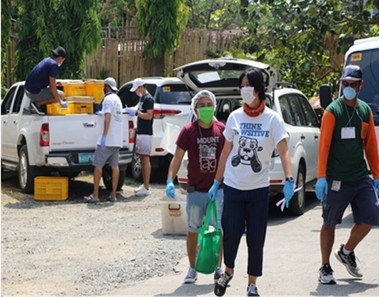【20-24】フィリピンにおけるCovid -19感染について
2020年6月08日

Rey B. Oronan:
DVM, MS College of Veterinary Medicine University of Philippines、さくらサイエンスプラン同窓生
科学技術振興機構(JST)中国総合研究・さくらサイエンスセンター(CRSC)では、2014年度より日本・アジア青少年サイエンス交流事業「さくらサイエンスプラン(SSP)」を実施し、科学技術交流を通じてわが国とアジアを中心とした各国・地域との連携・協力関係を深めてまいりました。各種報道の通り、現在、世界中で新型コロナウイルス感染症の流行が拡大しておりますが、本コーナーでは「さくらサイエンスプラン」に参加している各国・地域の関係機関・関係者より現地の新型コロナウイルス感染症について、その状況や対策等をリポートします。
1. フィリピンにおけるCovid-19感染状況の概要
2020年4月14日現在、フィリピンでは合計4,932件のCovid-19症例を確認し、315人が死亡し、242人が回復しました。1月30日に確認された最初の3人のCovid-19患者は、観光客として入国した中国人でした。3月5日には日本への旅行経歴があるフィリピン人が陽性となり、それがフィリピン人として初めての感染者でした。その後、感染者数は増加を続け、3月31日には陽性症例数(538例)で最も高い数字となりました。
2. ウイルス感染制御のために政府が取った措置は?
1月当初に保健省は、適切な手洗いや咳・くしゃみエチケットのガイドラインを策定し、感染を防ぐための「社会的距離」(後に「物理的距離」と改名)を保つよう推奨しています。感染した可能性のある人を見つけるため濃厚接触者の追跡を行い、彼らを隔離しました。3月8日までに、ロドリゴ・R・ドゥテルテ大統領はフィリピン全体を公衆衛生上の緊急事態の下に置き、3月16日までに、ルソン島を「コミュニティ隔離措置(ECQ)」の下に置きました。他の州も2人以上の症例が確認され、ECQが適用されました。ECQでは、陸路、空路、海上の移動を制限して大量輸送を停止し、政府機関は休業したり、必要に応じて在宅勤務としています。警備、医療、その他の重要な仕事に従事する者のみ、最小限の労働力として仕事に従事する必要があります。厳格な自宅待機も推奨され、食料品や必需品の買い出しは1家族で1人に限られています。ECQは4月30日まで期限が延長されたが、政府は経過をみながら現状を再評価することとなります。

3. 今回のパンデミックを通して国として学んだことは?
私自身はフィリピンが本当にパンデミックへの備えができていないことを知りました。医療制度とECQの政策が不十分でした。ECQ施策中は交通機関を停止したため、医療従事者や民間企業の従業員に大きな影響を与え、彼らは仕事に行くことができなくなりました。このことは、必要不可欠な労働者に無料の交通手段を提供することによって改善されました。しかし、働かないと収入を得られないフィリピン人や、日雇い労働者(その日暮らしの非正規労働者)が多く存在し、彼らは仕事に出かけることができないため、食料品を買うお金を持っていません。フィリピン政府は、災害資金を使って地域社会に食料を提供するよう地方自治体に命じましたが、物資の獲得と流通には問題があります。一部の地域では救援物資の分配を受けましたが、他の人々は受け取ることができなかったりしました。そのため、食べるものがないこれらの人々は、多くの場合、ECQガイドラインに違反して外出をしますが、彼らを責めることはできません。また、中には必要な医療情報を意図的に伝えない人々がいます。患者が診察中に旅行歴について嘘をついたために、数人の医師や医療従事者が感染し、中には死亡した人もいました。
4. このウイルス感染は日常生活や仕事にどのような影響を与えますか? また、意見があれば付け加えてください。
私は教育者ですが、授業は休校となりました。当初、私たちはオンラインで授業を行うよう指示を受けましたが、インターネットにアクセスできない学生がいることや、不安や心理的な不安を持つ個人に配慮し、ECQ実施期間中、中断することになりました。
教師の立場として、私は今年卒業する学生を受け持ち、指導しているので、学生達の進路を心配しています。卒業するための最低単位数を取得できていない学生は、卒業を延期することができるようにしました。卒業学年以外の学生も、今習得しているスキルが、次の学年の課程に到達できてはいないかもしれません。
私たちは約1ヶ月間自宅隔離されていて、常にパンデミックの情報をアップデートしています。これまでの日常が変わりました。私は常に家にいることに慣れてはいませんが、大学から求められる課題をこなす以外は、家族と一緒に時間を過ごす機会にもなっています。
※本稿はさくらサイエンスプラン同窓生からの寄稿文を中国総合研究・さくらサイエンスセンターが日本語訳したものである。
●英文オリジナル
COVID - 19 in the Philippines
Rey B. Oronan, DVM, MS
College of Veterinary Medicine
University of Philippines Los Baños Laguna,
Philippines
1.A brief situation of the Covid-19 infection in your country.
As of April 14, 2020, The Philippines has a total of 4932 confirmed COVID-19 cases with 315 deaths and 242 recoveries. The first three COVID-19 patients who were confirmed on January 30 are Chinese nationals who went to the country as tourists. The first Filipino who was confirmed positive on March 5 and had a recent travel to Japan. From then, the number of cases kept on rising with the highest number of positive cases (538) on March 31, 2020.
2.What are the measures taken by your government to control this virus infection
Initially in January, the Department of Health issued proper handwashing guidelines, coughing and sneezing etiquette, and has recommended social distancing (which was later renamed physical distancing) in order to prevent infection. Contact tracing to the positive cases was done to find possibly infected people and to quarantine them. By March 8, President Rodrigo R. Duterte, placed the entire Philippines under a State of Public Health Emergency. By March 16, the Island of Luzon was placed under Enhanced Community Quarantine (ECQ); other provinces also followed ECQ upon confirmation of more than 2 cases. During the ECQ, mass transportation was suspended with restriction of land, air, and sea travel. Government work has been suspended or work from home, if applicable, was arranged. Only those who provide security, healthcare and other essential work are required to go to work in skeletal work force. Strict home quarantine was also recommended with only one person per family allowed to go out to buy food or essential items. The ECQ has been extended until April 30 however, the government will reassess the local condition as the days go by.
3.What has been learned in your country with regard to his pandemic?
I have learned that the Philippines is not truly prepared for a pandemic. The healthcare system, as well as the planning for the ECQ was inadequate. During the process of ECQ where transportation has been suspended. The healthcare employees and the employees of private companies were massively affected; they cannot go to work. This has been rectified by providing free transportation to essential workers.
However, there are a lot of Filipinos who are on a no-work-no pay basis, or who are hand-to-mouth individuals (informal workers where they can only eat based on how much they can earn in the day); they cannot go out to work thus they do not have money to buy food. The national government ordered the local government to provide food for the community using their calamity fund but there are problems in the acquisition and distribution of supplies. While some communities received their share of relief supplies, other families or individuals were unable to receive theirs. Thus these people who have nothing to eat will often go out of their house violating the ECQ guidelines but we cannot blame them, or else they would perish. Aside from them, there are those people who deliberately withhold necessary medical information. Several doctors and healthcare workers got sick and some died because their patients lied about their travel history during consultation.
4.How is this virus infection affecting your daily life and work? You might like to add in your other opinion.
As an educator, classes were suspended. Initially, we were ordered to use online platform to conduct classes but this was suspended during the ECQ since there are students who do not have access to internet and to give consideration to individuals with possible anxiety or psychological concerns. As a teacher, I worry for my students' welfare since I have graduating students and thesis advisees; their
graduation can be postponed since they have not yet attained the minimum requirement for graduation.
For my non-graduating students, their skills attained now may not be enough for their higher level courses.
We have been in home quarantine for about a month now and we are always tuned in on the news pandemic updates. Our previous routine was changed. Although I am not used to staying at home all the time, this is also an opportunity to spend time with my family aside from performing some of the tasks that the university is requiring us.
References:
https://www.worldometers.info/coronavirus/country/philippines/
https://www.philstar.com/headlines/2020/03/08/1999101/list-confirmed-covid-19-cases-philippines
https://en.wikipedia.org/wiki/2020_Luzon_enhanced_community_quarantine
https://www.philstar.com/headlines/2020/04/07/2006056/duterte-approves-luzon-wide-community- quarantine-until-april-30
https://www.doh.gov.ph/covid-19/case-tracker